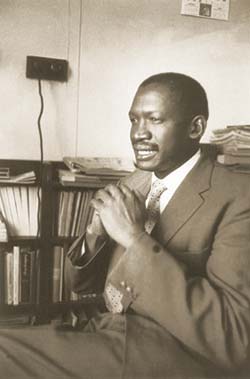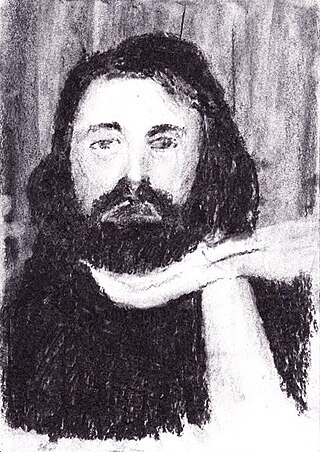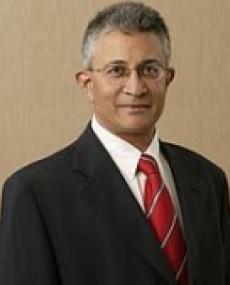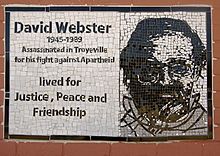
Winnie Madikizela-Mandela, also known as Winnie Mandela, was a South African anti-apartheid activist and the second wife of Nelson Mandela. She served as a Member of Parliament from 1994 to 2003, and from 2009 until her death, and was a deputy minister of arts and culture from 1994 to 1996. A member of the African National Congress (ANC) political party, she served on the ANC's National Executive Committee and headed its Women's League. Madikizela-Mandela was known to her supporters as the "Mother of the Nation".

The University of the Witwatersrand, Johannesburg, commonly known as Wits University or Wits, is a multi-campus public research university situated in the northern areas of central Johannesburg, South Africa. The university has its roots in the mining industry, as do Johannesburg and the Witwatersrand in general. Founded in 1896 as the South African School of Mines in Kimberley, it is the third oldest South African university in continuous operation.

Robert Mangaliso Sobukwe OMSG was a South African anti-apartheid revolutionary and founding member of the Pan Africanist Congress (PAC), serving as the first president of the organization.

Neil Aggett was a Kenyan and South African doctor and trade union organiser who was killed, while in detention, by the Security Branch of the Apartheid South African Police Service after being held for 70 days without trial.

The Witwatersrand Gold Rush was a gold rush that began in 1886 and led to the establishment of Johannesburg, South Africa. It was a part of the Mineral Revolution.

Ahmed Mohamed Kathrada OMSG, sometimes known by the nickname "Kathy", was a South African politician and anti-apartheid activist.

Valli Moosa is Deputy Chairperson of the Presidential Climate Commission and Chairperson of the Constitution Hill trust. He was born in Johannesburg and is a veteran of the South African freedom struggle. Valli worked closely with Nelson Mandela during the settlement talks, served as negotiator for the ANC, and participated in drafting the South African Constitution. He served in President Mandela's cabinet as Minister of Constitutional Development, and in President Mbeki's government as Environment Minister. Valli joined the corporate sector in 2004 and currently serves on the board of Sappi Ltd. He has previously served on the boards of Anglo Platinum, Eskom and Sanlam. Valli served as a facilitator in the global climate change negotiations for a number of years. He previously served as President of the International Union for the Conservation of Nature (IUCN), as Chairman of the UN Commission on Sustainable Development and as Chairman of WWF(SA).
Bertrams is a suburb of Johannesburg, South Africa. It is a small suburb found on the eastern edge of the Johannesburg central business district (CBD), tucked between the suburbs of New Doornfontein and Lorentzville, with Troyeville to the south. It is located in Region F of the City of Johannesburg Metropolitan Municipality.
The National Union of South African Students (NUSAS) was an important force for liberalism and later radicalism in South African student anti-apartheid politics. Its mottos included non-racialism and non-sexism.

The South African Civil Cooperation Bureau (CCB), was a government-sponsored death squad, during the apartheid era. The CCB, operated under the authority of Defence Minister General Magnus Malan. The Truth and Reconciliation Committee pronounced the CCB guilty of numerous killings, and suspected more killings.

Internal resistance to apartheid in South Africa originated from several independent sectors of South African society and took forms ranging from social movements and passive resistance to guerrilla warfare. Mass action against the ruling National Party (NP) government, coupled with South Africa's growing international isolation and economic sanctions, were instrumental in leading to negotiations to end apartheid, which began formally in 1990 and ended with South Africa's first multiracial elections under a universal franchise in 1994.
Ari Sitas is a South African sociologist, writer, dramatist and civic activist.
Amina CachaliaOLB was a South African anti-Apartheid activist, women's rights activist, and politician. She was a longtime friend and ally of former President Nelson Mandela.
Cedric Nunn is a South African photographer and educator.
Louis Marius Schoon was a white anti-apartheid activist of Afrikaner descent. Marius died from lung cancer, after a long call from Nelson Mandela, thanking him for his sacrifice against the struggle.

The David Webster House is at 13 Eleanor Street in Troyeville and it is important not only because this is where the anti-apartheid activist David Webster lived but it is also where he was killed by a government assassin. The house is still in private ownership but it is decorated to commemorate his life.
Mary Malahlela-Xakana was the first Black woman to register as a medical doctor in South Africa. She was also a founding member of the Young Women’s Christian Association.

Maxwell Sakhela Buhlungu is a South African sociology professor and university administrator. He is the current vice chancellor of University of Fort Hare and the former dean of humanities at University of Cape Town. Buhlungu's work focuses on the labour and other social movements. He has also taught at the University of the Witwatersrand, the University of Johannesburg, and the University of Pretoria. At Fort Hare, his efforts to combat corruption lead to threats that culminated in a January 2023 assassination attempt that killed his bodyguard. Before academia, Buhlungu worked as a teacher and was the assistant general secretary of the Paper, Printing and Allied Workers' Union.
Eddie Roux was a Transvaal Colony-born botanist, academic, writer, member of the South African Communist Party and anti-apartheid activist.











